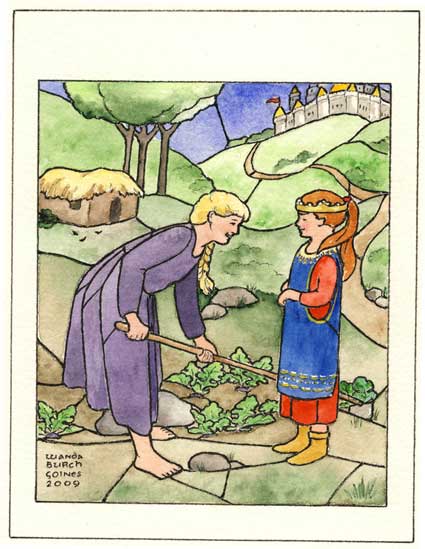
1996 David Lance Goines
 |
One morning Princess Soapy put on her finery and walked down the path leading from the castle to the village, and through the village and beyond to the farmlands. There she met a peasant grubbing in her field, and said, "Good morning, Mrs. Peasant. How are you today?"
The peasant looked up from her hoe and replied courteously, "Good morning, Princess Soapy. I am quite well, thank you. And how's yourself?"
"Just fine, thanks," said Princess Soapy. And there she stopped, at a loss for words.
"Would you like a cup of tea?" asked the peasant, helpfully.
"Why yes, that would be most welcome," replied the princess, realizing that she had come away without a bite of breakfast, and sharply aware of a need within her for a little something.
"Come into my cottage and I'll make you one," beckoned the Courteous Peasant.
"My!" Princess Soapy exclaimed, "It's so pleasantly warm in here! My castle is always cold, even in the summer."
"That's because my cottage is of only one room, and has a very low ceiling indeed," said the Courteous Peasant. "Even a tiny fire is sufficient to warm it, which is a good thing, firewood being so dear and all. And, it helps to have the cows and pigs in here, as well. You see that the smoke goes out this handy hole in the ceiling," she indicated the smoke-blackened ceiling proudly."At the castle, we never get fires at all, except in the kitchen. Firewood is far too expensive," Princess Soapy replied, rubbing her hands briskly over the hob. "We only get fires on Christmas, and New Years Eve and when we have magnificent banquets, which is not often. The ceilings are so high in the dining hall that you can hardly see them even when there's no smoke, and the room is always as cold as an icicle. We get to put our feet on dogs, though, and that keeps them warm."
"Your feet or the dogs?" responded the peasant, politely.
"My feet or the dogs what?" Princess Soapy asked, somewhat confused.
The peasant clarified her question, "Do you put your feet on the dogs to keep the dogs warm or to keep your feet warm?"
"To keep our feet warm." Princess Soapy answered, "The dogs lie on rushes, and eat bones. They're always happy, unless you step on their tails. My room is high in a tower, and the wind blows through it if the window is open, and if the window is closed it's dark as pitch. I almost never get to have a fire unless I'm sick, and then it's only a little one, and I can't enjoy it."
At that point, the kettle began to whistle, and the peasant lifted it off the iron hook that held it over the tiny fire.
"Here you go," said the peasant, readying a cup for each of them. "Do you take cream?"
"I like mine with the cream in first," Princess Soapy indicated. The Courteous Peasant poured a dollop of cream into each cup, and then a stream of fragrant tea, filling each to the brim.
Princess Soapy took a sip, "My!" she exclaimed, "It's quite hot!"
"Well, of course it is," replied the Courteous Peasant, "It's just been poured out of a boiling teapot. What did you expect?"
"My tea," replied Princess Soapy, taking a cautious sip, "Is always tepid. The water is heated in the kitchen, and then poured into the pot, and then carried up three flights of stairs to my room, and by then it's not hot any longer. I've tried to get Cook to make it differently, but she say it's impossible. This is quite a treat, I must say."
"Have a scone," said the Courteous Peasant, pushing a plate her way.
"Don't mind if I do, and thanks heaps," said Princess Soapy, buttering a large chunk. "You know, this is an awfully nice place you've got here, Mrs. Peasant."
"You're welcome to stay as long as you wish," replied the Courteous Peasant with a broad gesture of her arm.
"My cottage is your cottage."
"I'll ask my father," Princess Soapy curtsied, patting a passing pig. "I'm sure he'll allow it. Thank you for the tea, and for your company and for the buttered scone. I love food." And Princess Soapy walked back to the castle, feeling much better.
When Princess Soapy got back to the castle, she went directly to her father's study, where he was looking at a large map of his kingdom. "Yes, my Dear? What brings you here this lovely morning?"
"Father," Princess Soapy said, "I would like to speak with you."
"My Dear," responded her father, the King, "you are in fact speaking with me right now."
"Father," Princess Soapy continued, "I would like to go and live with a Courteous Peasant whom I met this morning on a walk. She made me tea. She lives in a cottage with cows and pigs. I like her."
"Well, my Dear," responded her father, taken somewhat aback, "I don't see how that's possible. You are royalty, and she is a commoner. Such things are just not done."
Princess Soapy had not considered this complication, and stood puzzled for a moment. "Father," she responded after an interval of silence, "What is the difference between a person of royalty-such as myself-and a commoner?"
"Well," her father replied, "commoners are not of royal blood. Royalty is of royal blood."
"How," Princess Soapy enquired, "does the ball get rolling? I mean, when Adam and Eve were created, there was just one set of people, not two. Where did royal blood come from?"
"At one point," her father, the King, replied, "I suppose that the blood became enriched, as it were."
"I have an idea," Princess Soapy suggested brightly. "Why don't we begin the enriching process right now, and bestow a patent of nobility on the Courteous Peasant. Then, I could go and live with her in her comfortable cottage, and no eyebrows would be raised. Or not too many. She did give me hot tea and a buttered scone."
"People have been ennobled for less," her father mused.
So, Princess Soapy walked back to the Courteous Peasant. The peasant was as before, grubbing amongst her turnips. "Good morning, Princess Soapy. And how are you this fine day?"
"I have good news," Princess Soapy announced importantly.
"And what," replied the Courteous Peasant, "might that be?"
"You are to be granted a patent of nobility forthwith. Then, I can come and stay with you. Before, I couldn't because you are a commoner and I am of the blood royal, but we are to begin the enriching process immediately."
"Well, all right," said the Courteous Peasant, "But let me feed the cows first."
"I'll help," Princess Soapy offered, "and then we'll go."
Princess Soapy and the Courteous Peasant filled the cow's mangers with hay, slopped the pigs, scattered feed for the chickens, gave a bone to the dog, set out a saucer of milk for the cat and when they were done, Princess Soapy took the Courteous Peasant's arm, and together they walked back to the castle.
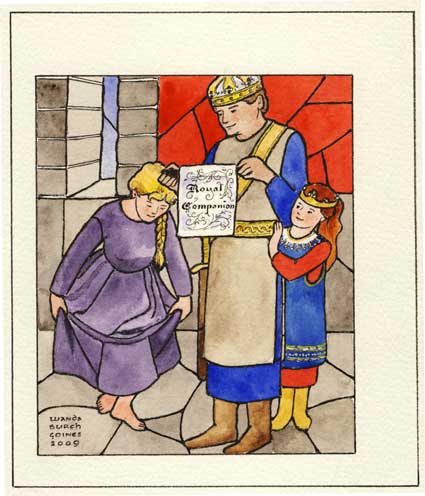 |
"Father," said Princess Soapy, "allow me to introduce Mrs. Peasant. She's the one whom you said you would ennoble. Mrs. Peasant, my Father, the King."
They shook hands. Sentiments were exchanged: "Pleased to meet you," and "Charmed, I'm sure."
"Do sit down," the King said, waving at chairs. "Would you care for some tea?"
"Delighted," responded Mrs. Peasant.
"Yes, please," said the princess. "And may we also have some of those biscuits? The sweet buttery ones?"
Civil chit-chat about weather and ailments of cows accompanied the tea and biscuits. After a decent interval, the King fixed his eye on the Courteous Peasant and said, "Well, Mrs. Peasant. You are here to be ennobled, and we might as well get to it. No sense in beating about the bush. We all have work to do, after all. Shall we begin?"
"Does becoming a noble require any actual work?" the Courteous Peasant asked, suspiciously, "I have quite enough to do as it is."
"Not to speak of," the King replied thoughtfully. "Let me see. Rather than pay your taxes to the tax collector, as you do now, you pay them directly to me. It is more dignified to do so. Actually, the tax collector comes around as usual, since it would be an inconvenience for you to be trotting back and forth all the time, but you are supposed to bring me something in person once a year and pay a visit. New Year's Day is the traditional time. You could meet many of the other nobles as well. There are quite a few."
"Do I pay more?" asked the Courteous Peasant, alarmed. "Last year I paid one pig, a large cheese, a bundle of flax, two laying hens, two bushels of barley, three bushels of vegetables in season, four bushels of apples, five large bundles of sticks and twigs, the maintenance of my stretch of road, my share of community upkeep of the bridge, one week of labor in the community fields at plowing, one week at harvest and one week of miscellaneous labor when needed. Last year it was cooking for workers at the quarry. That was quite enough, thank you."
"Your taxes will not go up at all," the King replied quickly. "Plus, you need not show up in person to work. You may send a representative."
"I don't have a representative," replied the Courteous Peasant, a bit crabbily.
"Well, the hours are more flexible," the King hastened to remark, feeling that the pleasure of the moment was being lost, somehow, and wishing to put things back on the right track.
The Courteous Peasant brightened perceptibly at the promise of more flexible hours.
"Please stand," the King said, rising from his chair. Both the princess and the peasant did so. Drawing himself up to his full height, and adopting a stilted form of speech, the King rattled a piece of parchment and loudly proclaimed, "Here is a handsome piece of parchment, suitable for framing, which conveys to all who may wish to see it that you are now a member of the minor aristocracy, and entitled to all deference, respect and honor accruing to that condition."
"Father," Princess Soapy interrupted, "you need not shout. There are only the three of us here, you know. It hurts my ears."
"Sorry, my Dear. I get carried away," the King apologized. He continued in a tone suitable to a smaller gathering. "The actual position, which We have created especially for you, Mrs. Peasant, is 'Royal Companion.' Congratulations." He stuck out his hand, which was grasped by the Courteous Peasant and warmly wrung.
The King then handed the Courteous Peasant her patent of nobility. The Courteous Peasant, now a peasant per se no longer, but rather a Royal Companion, accepted the piece of parchment with a curtsy, and stood admiring it at length. "I can think of just the place this should go. Above the door, by the teacups."
"By the way," she asked after a moment of consideration, "I don't mean to be pushy, but in addition to the honor of being Royal Companion, is there any pay? The princess eats like a horse, you know."
"You receive, free and gratis, the assistance, help, company and conversation of the princess whenever she is staying with you," said the King. "We also will take care that she does not eat you out of house and home."
"That seems fair," the Courteous Peasant replied. Turning to the princess, she indicated the door and said, "Shall we go? We should not detain your father any longer. He is a busy man."
"Thank you father," princess Soapy said with a curtsy. "I am very grateful."
"A pleasure, my Dear. Please don't stay away too awfully long," said the King. "And, Mrs. Peasant. Would you please see to it that the Princess washes behind her ears, brushes her teeth and says her prayers? She is inclined to be neglectful."
"Your daughter will be treated as though she were my own, Your Highness," said Mrs. Peasant, putting her arm through that of the princess. "You need have no fears. Come along, Dear."
"Isn't my father a nice man?" Princess Soapy remarked, as she and Mrs. Peasant, now the Royal Companion, strolled along.
"Handsome is as handsome does," replied Mrs. Peasant.
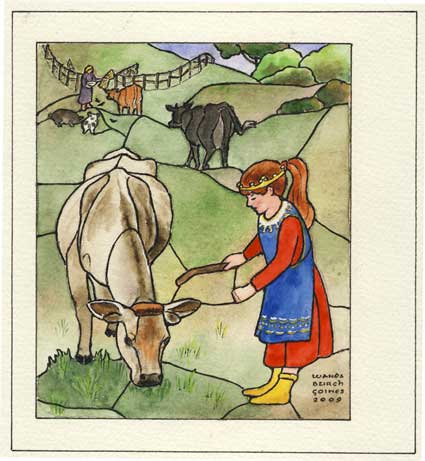 |
"Princess Soapy, would you please go out and open the gate for the cows? It's time for them to come home," asked the Courteous Peasant.
"Why, I'd be just delighted," replied the princess, skipping off to the farmyard gate. Right outside were the three cows. Princess Soapy opened the gate, and pulled it aside so the cows could come through. Two of them ambled in, but the third stood as though in some doubt about the wisdom of following. Princess Soapy went through the gate and flapped her apron at the cow. "Shoo, cow. Go home. It's time for dinner." But instead of going through the gate, the cow turned and went the other way. Princess Soapy ran ahead and stopped in front of the cow. The cow also stopped. They looked at each other, and Princess Soapy stamped her foot, "Cow, it's time to go home. Don't be bad." The cow looked at her and did nothing. Princess Soapy decided that it was time for drastic measures, and picked up a small switch. She waved it in front of the cow, to make sure that the cow was aware that drastic measures were about to be taken. Then, she went around to the side of the cow and lightly tapped it on its hindquarters. At this, the cow began to walk, but not in the direction of the gate. Princess Soapy ran after the cow, and when it stopped she looked up to see that the other two cows had followed, and the pigs and chickens, as well. She had neglected to close the gate when she followed the straying cow, and now all the animals were out and wandering about. Princess Soapy was sorely tempted to use a bad word.
The Courteous Peasant noticed the unusual silence, and looked out the door of her cottage. "Aha! Princess Soapy has not closed the gate, and all the animals are out and about." At this, she went to the center of the yard and called, "Chick-chick-chick-chick-chick!" and scattered seed. The chickens stopped, turned and flocked back into the yard.
Then, the Courteous Peasant called "Sooo-eeee! Pig pig pig pig pig! Soo-eee!" and the pigs perked up their ears, turned and galloped back to the warm slop that the Courteous Peasant poured into their trough.
The Courteous Peasant then gathered big armsfull of fragrant hay and piled them into the cows' manger. "So, Bossy! Bossy! So, Bossy!" she called, and the three cows turned and clanked their cowbells and ambled back, through the gate and into their manger.
Then, she called, "Princess Soapy! Time for dinner!" and Princess Soapy walked into the yard, and closed and barred the gate. "The cow didn't come when I stamped my foot or switched it," Princes Soapy complained. "In fact, it went the other way."
"You get more flies with honey than with vinegar," the Courteous Peasant replied.
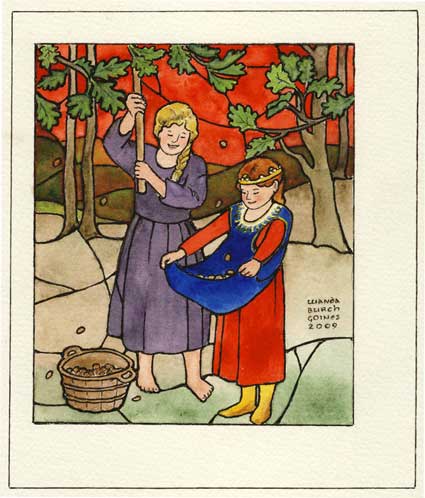 |
"This time of year," said the Courteous Peasant, "I like to go into the woods and collect acorns."
"Do they taste good?" asked Princess Soapy.
"I think they taste awful," replied the Courteous Peasant, "but the pigs like them."
So the princess and the peasant took baskets and walked into the woods. There were plenty of acorns on the ground, and even more on the trees. Princess Soapy took a long stick and banged on the branches, and was rewarded by a shower of acorns, many of which landed on her head. "Ow," she said, as one hit her square on the nose.
"You don't have to look straight up, you know," remarked the Courteous Peasant. "If you just walk about with the stick pointed in the air, and bang on branches as you go, the acorns will fall quite nicely. Your looking at them as they fall does no great good, and some of them will surely hit your head, as you have just discovered."
"I see your point," responded Princess Soapy, and continued walking under trees and hitting the lower branches with her stick, humming amidst the patter of falling acorns. But, she did not look up while doing so.
Soon, both baskets were filled with acorns. A full basket was a bit too much for one person, so they carried them one at a time. Princess Soapy took one handle, and the Courteous Peasant took the other, and together they lugged the basket back to their cottage. Then, they went under the trees and fetched the other.
"Can we do this again, soon?" asked the princess.
"Not only can we do it again soon, but we can do it again right now," said the Courteous Peasant. "We should keep this up until we run out of storage room or until the woods runs out of acorns, whichever comes first."
Princess Soapy and the Courteous Peasant gathered and lugged, lugged and gathered until it was time for lunch.
"I hope the pigs appreciate what we're doing," said Princess Soapy. "This is hard work."
"The pigs might not, but I do," said the Courteous Peasant "I harvested acorns all by myself last year, and it was not nearly as much fun as having you to help. Plus, I didn't harvest half as many."
"It's my pleasure, Mrs. Peasant." Princess Soapy replied politely. "Please pass the jam."
After lunch, and a refreshing cup of tea, Princess Soapy and the Courteous Peasant went back to harvesting acorns.
"Did you ever notice," Princess Soapy remarked as she held out her apron for the Courteous Peasant to heap with acorns, "how acorns look like little people wearing close-fitting caps?"
"Now that you mention it," responded the Courteous Peasant examining one thoughtfully, "so they do. Little brown people, something like elves."
"Perhaps they are elves," Princess Soapy wondered.
"Pigs don't like elves," the Courteous Peasant replied, looking carefully at an acorn. "I can understand that," said Princess Soapy. "They're not for eating, anyway."
"Elves play tricks," said the Courteous Peasant, as together they lugged another basket back to the cottage. "They make the cows go dry, and make hens stop laying. They tangle your hair into rat's nests while you sleep, and they don't like to be seen. They hide if people are about."
"Perhaps they're afraid," Princess Soapy suggested. "Perhaps people are unkind to them, and the elves are unkind back. Sometimes people are that way, too."
"That might be," said the Courteous Peasant.
"At the castle," Princess Soapy went on, "every night we set out a saucer of milk by the kitchen door. The elves drink it, and don't play tricks because they are thankful for the milk. Once Cook forgot, and it took me a week to comb my hair smooth. Her hair was a fright. She had to cut out some of the tangles with scissors. My, she was angry!"
Princess Soapy worked her way around a large oak. She picked up a particularly plump acorn, and held it in her hand. It looked even more like a person wearing a tight-fitting cap than any of the others. "Hello, Princess Soapy," the acorn said, and winked.
"Oh!" Princess Soapy squeaked, and set the acorn down carefully. "Mrs. Peasant," she cried, running back to the Courteous Peasant, "Mrs. Peasant!"
"Yes, Dear?" the Courteous Peasant said, looking up from her basket.
"Mrs. Peasant, an acorn just spoke to me."
"And what did it say, my Dear?"
"It said, 'Hello, Princess Soapy.' It knew my name. It winked at me."
"Did you put it back where you found it?" the Courteous Peasant asked.
"I certainly did," the princess said, "and quickly, too."
"Good," said the Courteous Peasant. "It probably was an elf. We'd best be getting back. It's almost time for dinner, and the animals will be getting fussy."
"Let's set some milk out tonight," Princess Soapy urged. "A large saucer of it. Perhaps a scone, as well."
"Better safe than sorry," said the Courteous Peasant.
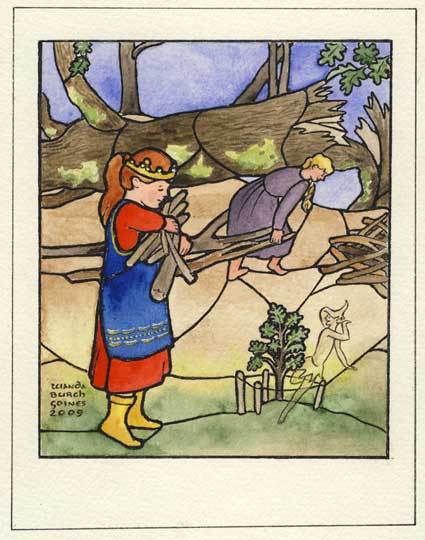 |
"When I wave my hand it makes a breeze. Is that what the trees are doing? Making the wind?" Princess Soapy asked the Courteous Peasant.
"I believe it is the other way about," the Courteous Peasant replied, thoughtfully. "The wind makes the trees wave."
"It certainly is making them wave right now," Princess Soapy observed.
"We," said the Courteous Peasant, "are in for a blow. Let's make sure the shutters are tight, and go to bed."
The wind howled through the chinks in the walls. It moaned under the door and shrieked down the smoke-hole in the roof. It sounded like a huge whistle, low and loud. Outside, things crashed and banged. A bolt of lightning flashed through the cracks and lit the room. A tremendous blast of thunder woke Princess Soapy, and she was glad that she wasn't by herself.
"Are you awake?" Princess Soapy asked, very quietly, in case the Courteous Peasant wasn't.
"Who," responded the Courteous Peasant, "could sleep through this kind of racket? I shouldn't be surprised if the roof blew off."
But Princess Soapy was asleep again, cuddled next to the Courteous Peasant like a kitten.
The Courteous Peasant and Princess Soapy looked out the door as they drank their morning milk. "I'll bet there are some wood nymphs out of homes hereabouts. But," the Courteous Peasant observed, "it's an ill wind that blows no good. Let's go gathering firewood."
The ground was littered with a rich harvest of branches and twigs. Princess Soapy and the Courteous Peasant gathered them into bundles and dragged them back and stacked them neatly by the wall.
"We'll have firewood for months," Princess Soapy said with delight, as she tugged on a large branch.
"Leave those big ones for the woodsmen, Dear," cautioned the Courteous Peasant. "They have saws and axes."
They came upon a party of woodsmen standing beside a huge old oak that the storm had blown down. A team of oxen and a drover stood by to drag the trunk and larger branches off. "Please join us," one of them beckoned. "We're about to sing. The more the merrier."
Princess Soapy and the Courteous Peasant joined hands with the woodsmen, and stood in a circle around a tiny, newly planted oak. It sat in a rich bed of wood chips and fertilizer, and was surrounded by a small neat fence. One of the woodsmen poured water over the seedling as they all sang,
Come out of your old tree, wood nymph.
It's blown down and no good to you any more.
Come out of your old tree into this seedling we have
planted.
Make this new tree your home and leave your old tree
behind.
They sang the song three times. The air felt heavy and quiet, like a blanket. The seedling began to tremble, then shake violently, though there was no wind. Then it stopped. The woodsmen bowed toward the new tree, and bowed toward the old tree, and began their work of cutting up the felled oak. "Thank you, ladies," one of the woodsmen shouted. "There are a lot of trees down. We'll have work for weeks. If you're about, join us for more plantings."
"There's enough wood in that tree to build a house," the Courteous Peasant observed.
"And enough firewood to warm it for years," agreed Princess Soapy. "Do wood nymphs always go to the new tree?"
"Sometimes they do, sometimes they don't," replied the Courteous Peasant. "If they don't, you just have to wait. Wood nymphs can't be rushed. They can be very ill-tempered indeed if you don't let them take their time. How would you like it of somebody chopped up your house while you were still in it. Not much, I'll bet."
"I certainly would not," reflected Princess Soapy. "It would put me in an extremely bad mood."
"Do unto others," said the Courteous Peasant, "as you would have them do unto you. Especially wood nymphs."
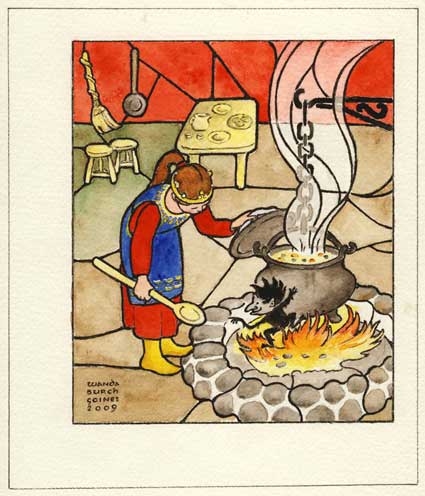 |
"This," Princess Soapy declared with conviction, "is good soup!" She tasted it again, just to make sure. And, in her estimation it was still good. A few moments later, she tasted it once more to see if it had changed for the worse. It had not.
"You know," said a voice from underneath the pot, "if you keep on tasting it, there will be nothing left for supper but your report that the soup was good."
"Who's that talking underneath the pot?" asked Princess Soapy, peering underneath the pot.
"It is I," said the voice, "your hobgoblin. I live in the cooking fire, and I like it."
"That would explain why you are entirely black, and rather small," said Princess Soapy, looking at a small black imp.
"Yes, I am indeed splendid, am I not?" boasted the hobgoblin, preening himself and turning about so the princess could admire him.
"That you are," agreed Princess Soapy, feeling that it would be unwise to say anything else. "Do you like anything particular," she asked, "or do you just eat any old thing that falls into the fire?"
"I'm not picky," responded the hobgoblin, "but I do like a good soup. Scones baked over the coals are nice. I don't much care for boiled-over milk. It tastes nasty."
"I've never much cared for boiled-over milk either," Princess Soapy agreed, "but sometimes you have to eat it anyway. It's a shame to be wasteful of food."
"That," exclaimed the hobgoblin with enthusiasm, "is why you have me! With me living underneath your cooking pot, there is no chance that anything will go to waste. Be easy in your mind, and don't be too careful when you stir things. I don't mind at all if things splatter or fall into the fire. You might even want to splatter a bit on purpose, if you follow my drift."
"I certainly do," Princess Soapy hastened to agree, "and though I have never been accused of being overly careful when I stir, I shall be at pains to stir even more vigorously from now on."
"And," the hobgoblin continued, "since we are on the subject of scones, an extra scone now and then would not be taken amiss. Share and share alike, I always say. Just leave it on the coals and I'll know it's meant for me, personally."
"I'll have to ask Mrs. Peasant, of course," the princess replied, wondering just how they had come to be on the subject of scones, "but I'm sure she'll agree."
"In return," said the hobgoblin, "since we operate strictly on the principle that one good turn deserves another, as well as the old tit for tat, you may have this magnificent cooking spoon, which is not only guaranteed to make everything you cook extra tasty, but is also specially designed to splatter more than ordinary. It is the Spoon of Power, and it has been made by skilled old-world craftsmen with you particularly in mind. Here." And, with a grand flourish, the hobgoblin produced a large wooden spoon.
"Isn't that the spoon I was just using?" said Princess Soapy suspiciously, as she took the Spoon of Power in hand and looked at it carefully.
"I'm glad you asked that question!" exclaimed the hobgoblin. "This shows that you are a keen observer, and not one to allow the wool to be pulled over her eyes! Not only am I your personal hobgoblin, but I am a prestidigitator!"
"What's that?" inquired Princess Soapy.
"It means that I'm good at magic tricks," replied the hobgoblin. "I have performed before Heads of State and Royalty (such as yourself), and am in great demand for parties and celebrations. I have, in fact, patented several renowned escapes. And," he continued, talking out of the corner of his mouth, "I can throw my voice!"
Princess Soapy looked around to see where the hobgoblin might have thrown his voice, so she could return it if necessary.
"Plus," the hobgoblin went on, his voice seeming to come from the upper corner of the room, "I am a renowned gourmand, and an authority on fine wines and cuisine of every kind. I will gladly share my extensive, indeed encyclopedic knowledge with you whenever you like. Simply pour some of whatever it is you're cooking into the fire, and I will immediately report on its shortcomings, flaws, and inadequacies, together with guaranteed failure-proof suggestions on how to make it far, far better. With the Spoon of Power in hand, your cooking skills will be the talk of the town!"
Princess Soapy wasn't entirely sure that she wanted a small, boastful imp drawing attention to the flaws, shortcomings and inadequacies of her cooking, but she felt it would be churlish to refuse. "Thank you very much, Mr. Hobgoblin. I will be sure to ask your help on the more difficult dishes, but I don't want to trouble you with everyday things. I'll save your advice for when I really need it."
"Just say the word," the hobgoblin insisted, waving a finger in the air, "and I am your servant to command! Toodle-oo!" With this, he disappeared beneath the pot.
"My," the Courteous Peasant said as she spooned her second bowl, "this is good soup!"
"Thank you, Mrs. Peasant," Princess Soapy replied, "I made it using the Spoon of Power that your hobgoblin gave me because I am good at splattering food into the fire. He is a famous cook, and is going to help me whenever I need it."
"No doubt," the Courteous Peasant replied, and helped herself to a third bowl of soup and another scone, "but you may want to take his advice with a few grains of salt."
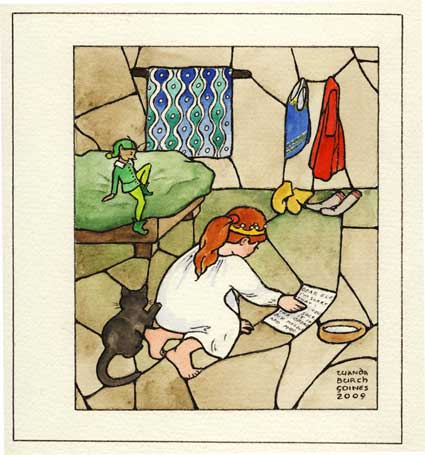 |
"La, la, la, la, la!" sang Princess Soapy as she went about her morning chores. As she gathered the breakfast things, she also put on her clothes, to save time. She got the bread out of the bread box, the cream and butter out of the cooler, and the jam out of the ant-proof jam jar. She then stopped to put on one sock and one shoe, and carried the other shoe and sock in the hand that was not busy carrying the jam. Then, she spooned out the jam into the jam bowl, and leaned down to put on her other sock, but it was gone.
"Where's my sock?" Princess Soapy cried out in astonishment. "It was in my hand not one moment ago, and now it's disappeared!"
The Courteous Peasant looked up from the cooking fire, "My Dear," she suggested, "you might go back over where you have just been, and perhaps the sock will turn up."
This is exactly what the princess did, but she did not find her sock. "It's gone!" she wailed. "My sock is gone!"
"Socks don't just go, they need someone to make them go," said the Courteous Peasant. "Who else has had your sock today?"
"Nobody," admitted Princess Soapy, "just me. But I had it in my hand, and then it disappeared. Perhaps the elf took it. Elves are mischievous, you know." With this plausible thought, the princess went on about her tasks, and looked for the sock at the same time. As she went through the house, she sang the plaintive lost sock song:
O sock,
O my lost sock,
I miss you so much,
My foot is cold without you.
The other sock is lonely, too.
Where are you, lost sock?
Please come back to me.
When breakfast was ready, she and the Courteous Peasant ate their morning tea and toast.
"My Dear," inquired the Courteous Peasant, "what makes you think the elf took your sock? What earthly use would an elf have for one of your socks?"
By this time, Princess Soapy had come to the conclusion that the elf had, indeed, taken her sock and had also figured out why an elf would take one sock but not two. "A thick wool sock would make quite a nice warm sleeping sack for an elf. It is cold out. Maybe the elf needed it more than I did, but was too shy to ask."
"That is indeed possible," agreed the Courteous Peasant, "but I'm not so sure."
The rest of the morning, Princess Soapy did her work with one cold foot and one warm foot. Every now and then, she changed the sock from one foot to the other, so that on average she'd be comfortable. By dinner time, she was thinking that she ought to have brought more than one pair, just in case of an emergency like the one she was experiencing at the moment. Or, she might knit another, but it wouldn't really match. Besides, the one sock was getting twice as much wear, and if her lost sock didn't turn up soon, she'd have to knit a whole new pair anyhow. But then, she'd have an odd sock. Or perhaps the one sock was only getting normal wear, but it seemed twice as much because the other sock wasn't getting any. Perhaps the elf needed two socks, or had a friend who needed a sock, too. Her thinking was becoming confused.
"This wouldn't be your sock," asked the Courteous Peasant, holding up a thick wool sock. "It's gray, with a red stripe around the top."
"Why yes!" the princess exclaimed, "Wherever did you find it?"
"In the bread box," replied the Courteous Peasant, "right next to the morning loaf."
"The bread box!" Princess Soapy marveled, snugging her formerly-lost sock onto her foot, "how very odd."
"I often find lost things in the bread box," the Courteous Peasant confided, "I sometimes put them there when I'm thinking of something else, and not paying particular attention to what I'm about."
"You know," Princess Soapy said, "I do the same, sometimes. Only it's usually the butter cooler. I'd better apologize to the elf. Are elves very forgiving?"
"I think," said the Courteous Peasant, "that it depends on just how much they were accused of doing something they didn't do, as well as how much forgiveness they feel like giving. Perhaps a large bowl of milk and a sincere apology would work."
That evening before going to bed, Princess Soapy set out an extra large bowl of milk and a note of apology. The note read:
Dear Elf, I'm sorry that I thought you took my sock.
I put it in the bread box myself, and Mrs. Peasant
found it when she went to get the loaf for dinner.
If you would like a sock to use for a warm bed, I would
be glad to knit you one. Please specify color and size.
I hope you enjoy the milk.
Yours apologetically,
Princess Soapy
The next morning, the milk was gone, the note was gone, and Princess Soapy's hair was just a little bit tangled.
"It's a lot easier to think before you speak," said Princess Soapy, wrestling with a snarl, "than to apologize afterward."
The Courteous Peasant took the hair brush and gently worked the tangles out of the princess' hair, and said, "I'll help you knit a sleeping sock for the elf."
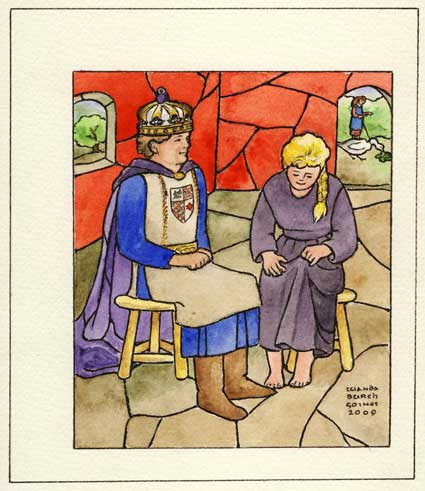 |
"Knock, knock."
Princess Soapy, busy with the dishes, heard the door and called politely, "Who's there, please?"
"It is your father, the King," responded her father, the King. He had a large basket of food under one arm, and was leading a goose on a string.
"Come in please, Father," said Princess Soapy, going to the door as she dried her hands on her apron, "I'm glad to see you."
"I was lonely," said her father, the King, as he gave her an affectionate kiss on the cheek, "and felt that I should visit and see how you and Mrs. Peasant are doing. It's the longest you've ever been away. Things aren't the same without you. You seem more grown up."
"Travel broadens one," Princess Soapy replied, "I've learned heaps of new things, and I met an elf."
"Indeed?" replied her father, settling himself on the milking stool.
"Yes. It winked at me, and knew my name," said Princess Soapy, "The hobgoblin is teaching me how to cook. Would you like some tea?"
"Delighted," said her father, the King, "It certainly is pleasantly warm in here."
"Isn't it, though," said Princess Soapy, as she handed her father a cup and saucer. "Be careful of the tea. It's hot."
"My word, but it is hot isn't it," said her father, the King, as he burned his tongue. "Not like home at all. Nice and warm in here, too."
"We have plenty of firewood since the windstorm," Princess Soapy said, conversationally. "We helped move a number of wood nymphs to new homes, and in return, the woodsmen gave us some lumber for repairs. Sometimes wood nymphs don't like to move, and this holds up the woodsmen considerably. The wood nymphs like my voice. Everyone says so. Have a scone."
"You've always had a delightful clear singing voice, my Dear," said her father fondly. "I'm not surprised that wood nymphs respond favorably to it. Why hello, Mrs. Peasant," said the King, as he rose in greeting.
"Your Highness," said the Courteous Peasant with a curtsey, "what a pleasant surprise. I see that the princess has offered you tea."
"Yes," the King responded, politely covering his mouth to prevent crumbs from spraying as he spoke, "and I must say," he continued after swallowing, "these are perhaps the most delicious scones I have ever tasted. I see why the princess was so eager to stay with you."
"It's my own mother's recipe," said the Courteous Peasant, blushing at the compliment, "please have another."
The King did so, helping himself liberally to butter and jam. "Indeed!" he said, when his mouth was empty again, "your own mother's recipe. Fancy that. The dear princess' mother, God rest her soul, was a talented cook. Her specialty was soups and stews. She could make a delicious soup out of a rock. All it took was a few scraps of vegetables to make it savory. That rock lasted for many, many soups. It was vital to the essential flavor, I believe. Haven't had rock soup in ever so long," the King mused, looking off into the distance. "It's still around, somewhere. The rock, I mean. I very rarely throw things out."
"I've never thrown anything out in my entire life," said the Courteous Peasant, agreeably.
"I do like thrift in a woman," said the King.
"If you will excuse me," Princess Soapy said, rising to her feet, "I have some chores that I just remembered. Come with me, goose. We have some cabbage patch bugs that need eating."
"The castle," said the King, "though spacious and well-appointed, lacks a woman's touch."
"Does it now," responded the Courteous Peasant.
"Indeed," the King continued, gazing at an interesting spot on the wall, "it has lacked a woman's touch for many years."
"I have grown excessively fond of the princess," said the Courteous Peasant, expressing an equal interest in a loose thread on her apron, "and should be dreadfully sorry to lose her company. I've been rather lonely myself since the Mister passed on."
"You need not be so, Mrs. Peasant," said the King, looking directly at the Courteous Peasant, and thereby noticing that she had quite nice eyes.
"Call me Flora, your Highness," said the Courteous Peasant.
"Edmund. Please," said the King. A comfortable silence followed.
"Flora," said the King, breaking the comfortable silence, "the princess needs a mother, and I-not to put too fine a point upon it-am lonely as well, what with just me rattling about in the castle. Would you consider sharing the joys and sorrows of our lives, and become my queen?"
"Edmund," said the Courteous Peasant, reaching out her hand and holding that of the King, "nothing would please me more."
"It is indeed fortunate that you are a member of the nobility," mused the King.
"It only serves to show," said the Courteous Peasant, patting the King on the shoulder, "what a farsighted and provident monarch you are."
"Perhaps we should share the glad news," said the King.
"I quite agree," said the Courteous Peasant. The King and his betrothed found Princess Soapy in the cabbage patch, leading the goose from one promising vegetable to the next, in search of tasty bugs.
"My Dear," said the King, holding hands with the Courteous Peasant.
"Yes Father?" said Princess Soapy, looking up from her work.
"Ah-hmm," the King continued, clearing his throat "Mrs. Peasant and I have come to an agreement."
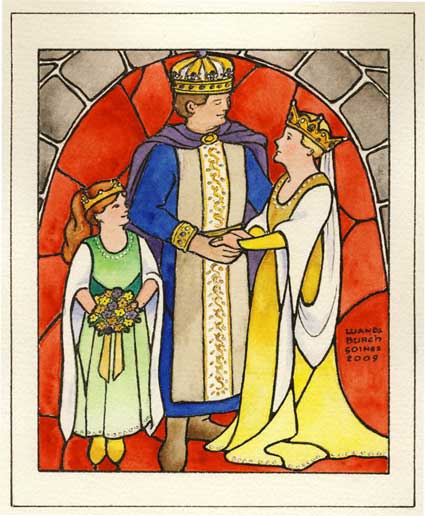 |
"And what might that be, Father?" Princess Soapy said brightly.
"Mrs. Peasant-Flora-" the King said, looking fondly at the Courteous Peasant, "has agreed to share the joys and sorrows of our lives."
"Splendid!" Princess Soapy exclaimed. "How nice! What do you mean?"
"I mean," the King explained, "that she has accepted my hand and half my kingdom, as the phrase has it."
"Does this mean that you will stay with us, or that we will stay with you?" asked the princess, looking at both the Courteous Peasant and her father, the King.
"Well, my Dear," said the Courteous Peasant, "there really isn't room enough for three in my cottage, warm and pleasant though it may be. Besides, your father has work to do, and needs space in which to entertain."
"Does this mean," the princess asked, "that we are going to live happily ever after?"
"Yes," said her father, the King.
"Yes," said the Courteous Peasant.
And Princess Soapy made a little secret smile that only she understood.
7/11/04
|
|||||||||||||||
| Previous Article | This Article | |
Return to N - T Index |